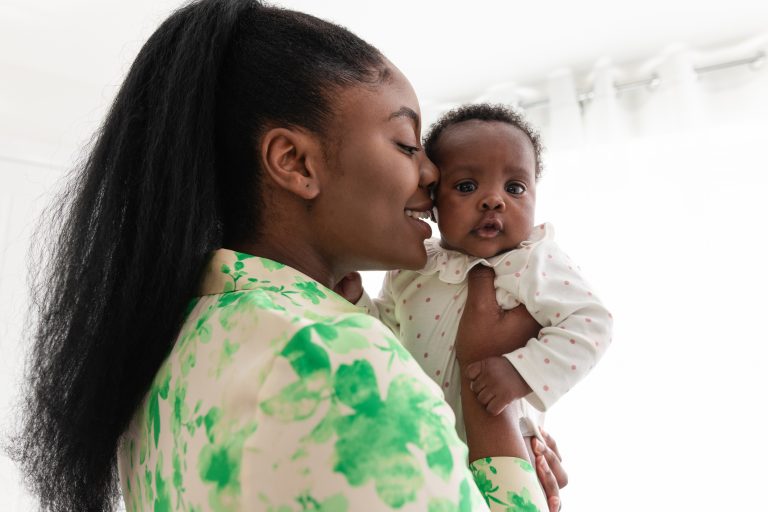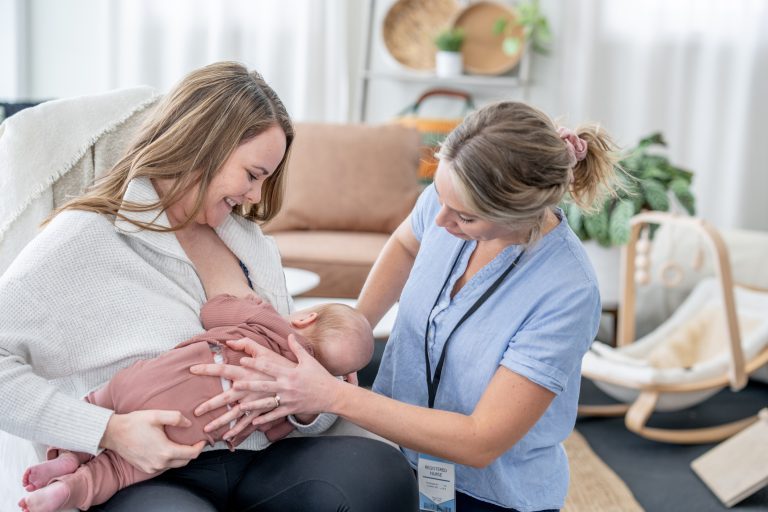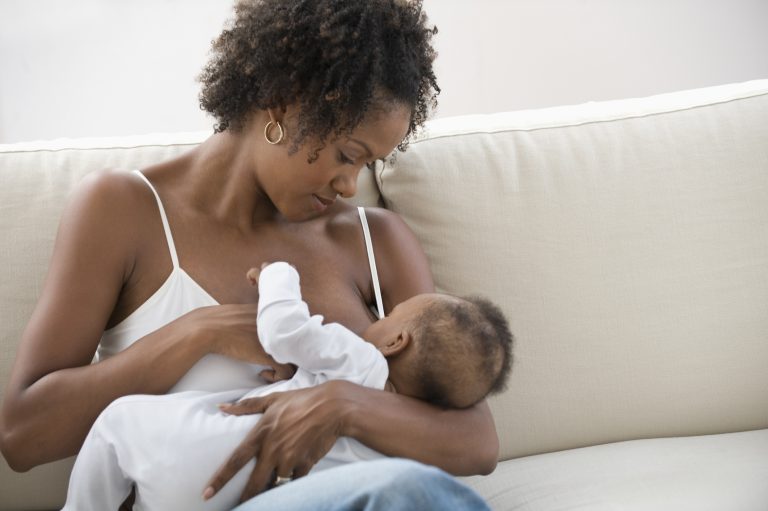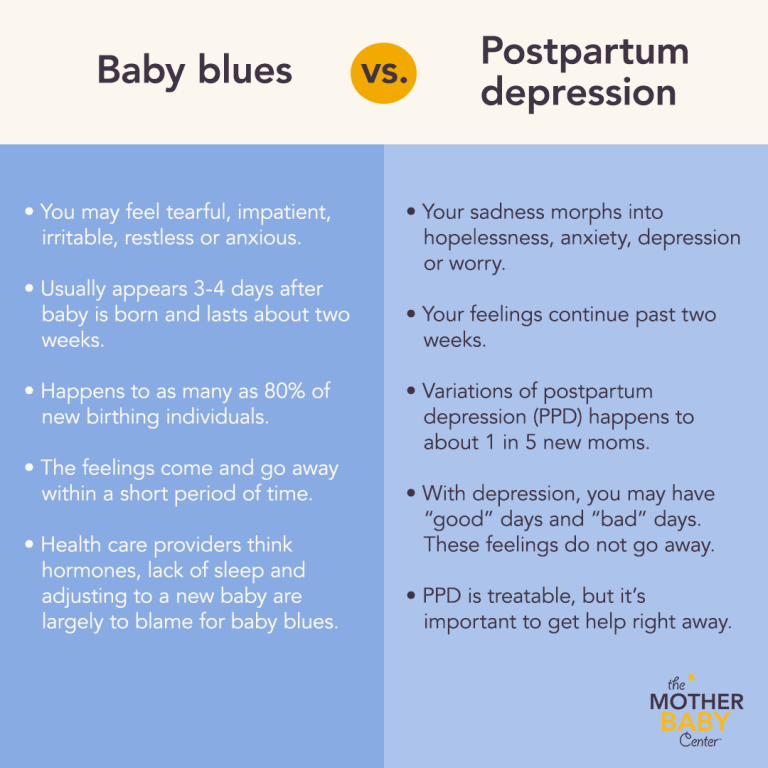This blog was medically reviewed by Jeffrey Sachs, MD, obstetrician and family medicine physician.
Whether this is your first or third child, postpartum can be difficult for every parent. The Mother Baby Center is ready to be your partner through it all from mental health support to providing insight into the postpartum essentials every mom will need.
During postpartum, not only is your body recovering from birth and experiencing pain, but it is also a time for adjusting to parenthood. Planning and having postpartum necessities ready for after you give birth can help with making this transition period smoother.

Learn what to expect during the fourth trimester and the initial postpartum period for your recovery and your baby’s health.
What is the postpartum period?
Postpartum, also known as the fourth trimester, starts right after you give birth, and lasts for 12 weeks. During this time there will be a lot of changes and adjustments for you, the baby and your family. While your baby is adjusting to the outside world, you will be adapting to motherhood and all the emotional and hormonal changes that come with pregnancy.
It is normal to feel overwhelmed, exhausted and uncertain about how to take care of your little one during this time. It is also not uncommon for women to experience baby blues or postpartum depression. Baby blues typically don’t last very long but if you’re experiencing extended or severe symptoms of postpartum depression, it is important to seek help.
Hygiene and healing postpartum essentials for mom
Products for hygiene and pain relief are postpartum must-haves for every person who has given birth. During postpartum, it is normal to experience some level of pain, which may vary depending on how you gave birth. For example, people that had planned c-sections usually don’t experience vaginal pain like the people that had a vaginal birth.
Regardless of if you had a c-section or vaginal birth, vaginal bleeding is expected and can last anywhere from four to six weeks. The bleeding is a normal part of the healing process, as the areas where the placenta was attached to your uterus are trying to heal. Keep reading to see what type of items should be included in a postpartum care kit.

The Mother Baby Center provides support after your baby is born and as your family’s new journey begins.
Pain relief medicine
If you had a c-section, it is common to get prescribed some pain relief medication by your doctor. If you didn’t get prescription-strength pain medication, ibuprofen or acetaminophen are common pain relief medications that can be bought over the counter and are safe to use while breastfeeding. Before starting any medication, talk to your provider to see if it’s right for you and your baby.
Ice pack and heating Pad
Another way to combat pain is by using ice packs and heating pads. If you’re experiencing swelling and discomfort around your vaginal area or c-section incision, ice packs will work best to combat the swelling. For discomfort like cramping in your abdominal area, heating pads will be your partner in crime.
Ice packs and heating pads are also useful for breastfeeding as well. Often, people will use heating pads on their breasts for 10 minutes before nursing to increase milk flow, and then an ice pack after breastfeeding to reduce any swelling that may happen from nursing.
Peri rinse bottle
If you had a vaginal birth, your vaginal area may be especially sore and tender, and can make going to the bathroom uncomfortable. Instead of using toilet paper to wipe and irritate your vaginal area, a peri rinse bottle can be used to rinse the area clean.
Sitz bath
Another postpartum item to consider adding to your postpartum care kit is a sitz bath kit. They are good for relieving discomfort in the perineum region and promote healing. Depending on the kit that you have, a sitz bath can be used on the toilet or in a bathtub.
You want to fill the sitz tub with warm water, place it in either a bathtub or toilet, and then soak your perineum area for 15-20 minutes. If you don’t have a sitz bath kit and would still like to try this method for relieving discomfort, try filling up a bathtub with warm water and soaking for 15-20 minutes. Unless directed by your provider, it is best to avoid Epsom salt when doing a sitz bath.
Perineal spray
Hemorrhoids and stitches in your perineum region after giving birth can cause discomfort and pain. If you don’t have time or can’t easily do a sitz bath, a perineal spray is another great option for relieving any pain or discomfort you may have.

Double check your third-trimester checklist so your family is ready when it’s time to bring your little one home.
Postpartum recovery kit
Postpartum recovery kits could be a good way to explore different postpartum items, especially if this is your first time going through postpartum and you aren’t sure what to get. When looking at postpartum kits, make sure they come with most of the items that you’re interested in trying. Some essentials that you’ll want to make sure are included are a peri rinse bottle, perineal spray and pads.
Supportive underwear
Another postpartum must-have, regardless of if you had a vaginal birth or c-section, is supportive underwear. During postpartum, supportive underwear can offer gentle compression and support to the abdominal area to help provide comfort and relieve any discomfort or pain.
Supportive underwear can also aid in the recovery of the pelvic floor muscles, which can weaken during pregnancy and childbirth. You can wear supportive underwear continuously in the early days after childbirth or only during an activity that you’d want the extra support.
Stool softeners and suppositories
It is not uncommon to experience constipation after childbirth. This can be caused by medications, pain from vaginal tears or incisions from a c-section, lack of physical activity and low fluid intake. This is where it can be helpful to add stool softeners and suppositories to your postpartum supplies.
Stool softeners and suppositories can be used together to help relieve constipation and they can both be bought at your local pharmacy or drugstore. However, it is important to talk to your health care provider about frequency of use and if you should be using just one or the other.
Witch hazel spray
Witch hazel is incredible for reducing inflammation, relieving itching and promoting healing, making it another essential to add to a postpartum basket. Witch hazel spray is great for hemorrhoids and can also be sprayed directly onto the perineum area to provide relief from any discomfort, swelling, and irritation. If spray isn’t ideal, you can also look for witch hazel pads.
How often you use witch hazel can vary depending on your need and preference. Whether it be once a day, multiple times a day, or less often. If you have any questions about usage, it is important to seek guidance from your health care provider.

Discover support groups for new parents and partners through The Mother Baby Center.
Menstrual pads
Menstrual pads are the ideal essential for dealing with postpartum bleeding. They are designed to handle different levels of bleeding and provide cushioning to prevent discomfort and irritation caused by direct contact with clothing or undergarments with the perineal area. It is recommended to avoid using tampons or menstrual cups during this time as they can increase risks of infection and other complications.
Disposable underwear or adult Diapers
Postpartum recovery essentials can’t be complete without disposable underwear or adult diapers, and the great news is that they can be purchased almost anywhere. During postpartum, these can be used to manage the heavy flow and potential leakage of postpartum bleeding. They provide a secure and comfortable fit, allowing women to feel more confident and protected during this time.
Hemorrhoid cream
Getting hemorrhoids during postpartum is not uncommon. That is why adding hemorrhoid cream to your postpartum care essentials can be a lifesaver. The cream can be used to help alleviate any discomfort caused by hemorrhoids and can be bought over the counter.
Numbing spray
Numbing sprays are another great option for relieving pain and discomfort during postpartum. They are commonly used to help with discomfort from hemorrhoids or vaginal tears and can typically be bought over the counter or at your local grocery store. Follow the packaging instructions for frequency of usage or talk to your health care provider for recommendations.
Epsom salt
Epsom salt is another popular item that you can add to your postpartum checklist. Epsom salt offers several benefits such as helping relax muscles, reducing pain and inflammation, promoting relaxation, and relieving stress and anxiety. It is fine to use Epsom salt a few times a week, but when in doubt, talk to your health care provider about the frequency of use or if this is right for your specific situation.
Prenatal vitamins
Prenatal vitamins are typically recommended for pregnancy to support the pregnant woman’s health and the baby’s development. But did you know? They can also be useful for postpartum.
Using prenatal vitamins during postpartum can help replenish nutrients that were lost during pregnancy and support breastfeeding by filling increased nutritional needs for milk production. However, if you’re not sure if prenatal vitamins should be included in your go-to postpartum products, it’s always best to consult with your doctor.

Learn how The Mother Baby Center provides childbirth recovery support and care.
Comfort and recovery postpartum essentials
Postpartum is already hard, but having the right products for comfort can help make the experience feel a little bit easier. Below are some of the best postpartum products that can be prepared ahead of time.
Comfortable clothing
Comfortable clothing is a must-have on your postpartum checklist. Postpartum can bring on a whirlwind of emotions and it’ll be important to choose clothes that will make you feel comfortable and confident. Postpartum clothing will depend on personal preference, but in general, you want to pick clothes that are loose-fitting or adjustable and allow easy access for breastfeeding if you’re thinking about breastfeeding your child.
For women that had a vaginal birth, postpartum recovery garments can be good to support and provide gentle compression to the abdominal area. If you gave birth via a c-section, make sure to wear soft clothes that will be gentle around the incision area. Some clothing examples are high-waisted bottoms or maternity leggings.
Lots and lots of pillows
Pillows are not only comfortable, but they can also provide quite a few benefits. Pregnancy pillows can still be used during postpartum to provide support to your body while it’s recovering from pregnancy and childbirth. There are also nursing pillows that can be used during times like breastfeeding to help position your baby in a spot that is optimal for latching. Nursing pillows can help improve the breastfeeding experience for both you and your little one.
Bidet toilet attachment
If you’ve been thinking about getting a bidet toilet attachment, postpartum would be the perfect time to invest. Managing personal hygiene can be challenging after childbirth due to feelings of discomfort, swelling, lack of mobility and more. Bidets can help by providing gentle cleansing without the need for excessive wiping and irritating the perineal area even more.
Before getting a bidet attachment for your toilet, be sure to consider if the bidet is compatible with your current toilet, plumbing system, that it has an adjustability feature to adjust water pressure and temperature, and whether it is easy to use.
Gentle, fragrance-free laundry detergent
If you’re not using gentle and fragrance-free laundry detergent yet, now is the time to consider doing so. They are great for maintaining skin health and minimizing the risk of allergic reactions or irritation for not only babies but also parents. Babies have delicate and sensitive skin that is easily irritated and for parents that had a vaginal birth, fragrance in laundry detergent can be a cause of irritants in the perineal area.

Peace of mind, delivered with the care you’re due at The Mother Baby Center.
Breastfeeding supplies
Although rewarding, breastfeeding can also be challenging at the same time. If you’re thinking about breastfeeding, working with a lactation consultant after childbirth can help prepare you for the journey. Lactation consultants offer families support with everything breastfeeding related and can help answer questions like how long to breastfeed or which breastfeeding positions you can try. In addition to added support, there are few breastfeeding essentials to have ready for baby’s arrival.
Breast pump
Breast pumps are essential for breastfeeding and there are many benefits to having one when breastfeeding. They give women the ability to pump breastmilk and use them for feeding at another time and minimize discomfort by regularly expressing milk and preventing breast engorgement.
For parents with their baby in the NICU, breast pumps ensure your child gets the benefits of your milk without having to traditionally breastfeed. For mothers that can’t breastfeed at all, breast pumps make it possible for other families to donate milk to support families in need.
Breast pumps can be purchased online but Children’s Minnesota also offers a loaner program to new parents who need a hospital-grade pump as well. There is a lot to consider when choosing which one is best for you, but some things to consider are how comfortable a pump is, its portability, cost and ease of use.
Nursing pillow
Nursing pillows are great for breastfeeding because they can help with comfortably positioning your baby and make it easier for them to latch for feeding. Even if you’re not breastfeeding your baby, they can also be great for bottle feeding or propping your little one up during tummy time.
Although nursing pillows can be a great tool, it is still important to keep in mind that they are not safe for babies to sleep with, and babies should not be left unattended with one.
When deciding which nursing pillow to buy, consider things like the size and firmness of the pillow, cost, material, ease of cleaning and cost. If not all, it is important to choose one that meets most of your needs.
Lanolin nipple cream
Breastfeeding can cause nipples to be dry and sore, but using a lanolin nipple cream after breastfeeding or as needed can help with moisturizing and soothing any discomfort, protect your nipples and promote the healing of cracked or damaged nipples. Finally, the best part about lanolin nipple cream is that it is safe for babies. It does not need to be washed off before breastfeeding.
Lanolin nipple cream can be bought at pharmacies, drugstores and online retailers. When deciding which one to buy, we recommend choosing a brand that is 100% pure lanolin with no fragrance or ingredients that can irritate sensitive skin.
Nursing pads
Breast milk leakage can be common after childbirth, especially if you’re breastfeeding. Nursing pads are great for absorbing breast milk leakage as they are small absorbent pads that can be worn inside a bra. They can be used as often as needed and are widely available to buy at pharmacies, drugstores, and online.
Breastfeeding bra
Breastfeeding bras or nursing bras were designed to support women breastfeeding. These bras have cups that can be easily unclasped to allow easy access to breastfeeding. They are also great because they accommodate the changes in breast size and shape during pregnancy and breastfeeding.
Breastfeeding cover and tops
We can’t always plan for when we need to breastfeed, which is why breastfeeding covers and tops can be useful for women having to nurse in public as they were designed to provide privacy, convenience and comfort.

Discover the incredible benefits of development and bonding with a baby through kangaroo care.
Postpartum must-haves for baby
Preparing the must-haves for a baby ahead of time will not only make your little one a happier and more comfortable baby, but it will also help make your postpartum experience a little bit easier already having the essentials on hand.
Diapers, wipes and rash cream
Diapers, wipes and rash cream are of course a necessity when having a baby. These three products are important to help keep our little one clean, comfortable and happy. Wipes are good for quick clean-ups, especially when you’re not at home. While rash creams can be helpful for soothing irritated skin and preventing chafing from diapers or clothes.
When purchasing wipes and rash creams, there are some things to consider to ensure that you’re choosing products that are safe and suitable for your baby. You want to pick products that are hypoallergenic and fragrance-free to avoid allergic reactions. For rash creams, look for products that include active ingredients like zinc oxide or petrolatum as these ingredients can create a protective barrier against irritants that can make a rash worse.
Changing pad
Changing pads are essential for baby care. They provide a comfortable and hygienic spot to change a baby’s diaper at any moment’s notice. The raised edges also make them a safer spot for diaper changes at home or on the go as the higher edges can prevent a baby from rolling.
Swaddle blankets
Manufacturers make swaddle blankets to mimic the womb environment and they are great for providing comfort, security and improving sleep. Swaddling makes babies feel calmer and less anxious because it recreates the feelings of being in the womb. Being swaddled also improves sleep patterns because it prevents babies from startle reflexes, which is when a newborn suddenly jerks their arms or legs and wakes up as a result.
Burp cloths and bibs
Burp cloths and bibs are great items to have, especially during feeding time. Burp cloths can be used to wipe the baby’s mouth or face during burping or as a protective barrier for the caregiver’s clothes from any spit-up, drool or milk. Bibs, on the other hand, can help keep a baby’s clothes clean and reduce the need for frequent changes of clothes.

Ensure your child’s health with a caring, and experienced physician, and find a provider today.
Baby thermometer
Baby thermometers come in handy when your little one isn’t feeling their best. They can help with monitoring fevers, assessing the severity of the illness and helping caregivers determine if medical attention is needed. You can easily find baby thermometers in-store or online, which is great news.
Pacifiers
Pacifiers are a baby-care essential as they can be used to satisfy an infant’s instinct to suck. They are great for providing comfort, soothing for sleep or if your baby wants to suck between feedings. It is important to keep in mind that pacifiers should never be used as a replacement for feeding. When choosing a pacifier, make sure to choose one that is the right size and shape for your baby’s age and development.
Although pacifiers are a great tool, they should be used in moderation. Consider limiting use while your baby is awake to prevent future dental issues or difficulty breastfeeding. As your child grows and is learning to self-soothe or able to cope with discomfort on their own, you can start weaning them off their pacifier.
Scratch mittens
Newborns typically have delicate skin and using scratch mittens to cover their hands can help with preventing them from scratching themselves with their fingernails. If a scratch has already happened, the mittens can also help prevent the baby from accidentally scratching the same spot further.
How often to use scratch mittens can depend on your baby’s age and their tendency to scratch themself. However, during supervised playtime, it is important to let your baby be able to explore their hands freely

Discover more articles offering guidance for your growing family from The Mother Baby Center blog.
Postpartum family support and care
Postpartum can be hard, but being surrounded by your loved ones, checking in with your partner often and carving out time for self-care can help.
Support network of friends and family
Going through postpartum can be difficult and isolating. Having the right support from your family and friends can make you feel less alone. They can also serve as a good resource if they’ve gone through the same experience.
If you’re finding it hard to ask your family for help or feeling guilty, know that it is okay and normal to ask for help, whether it is from family, friends, a postpartum doula or through a support group. Raising a child takes a village and your village can consist of anyone that makes the most sense to you.
Freezer meals or meal train
During postpartum, cooking can often be the last thing you want to do. Before giving birth, it can be a good idea to have some food prepared and frozen for those first couple of weeks after childbirth when you don’t want to cook. Another great idea for family and friends who are looking to provide support is starting a meal train. This is essentially when family members or friends sign up for a day that they will bring you hot meals after childbirth. This is a great way to take care of your family, have a bit of extra support and help.
Self-care time
Take the time to care for yourself, rest and recover. This can mean taking a longer shower as your partner looks after the baby, reading a book, taking longer naps when possible, painting your nails or anything else that can help you feel like yourself as you embark on this new stage of life.
In particular, not allowing visitors after childbirth has become increasingly popular. This can look different for everyone, whether it be no visitors for the first two weeks or the first three months. Even if you are allowing visitors, it is okay to block certain days or time off for self-care. Not allowing visitors right away would also give your newborn time to build a stronger immune system.
Parenting books and resources
Although rewarding, parenthood does also come with some challenges. Books and websites like the American Academy of Pediatrics Parenting Resources, Family Doctor or Healthy Children can be great resources for families. Additionally, support groups are also great to help parents prepare for this next chapter.
Partner check-ins
Frequently check in with your partner or other support person during the postpartum period to ensure everyone is on the same page, feeling heard and making you feel less alone during this journey. At check-ins, you can discuss things like what you need help with, what is going well and how each other is feeling. Check-ins can ensure that everyone is feeling supported.

Explore the benefits of gentle parenting and how this parenting style can be used even in the early postpartum stages.
When to seek professional help
Postpartum is a personal journey and can look different for everyone. Whether it is about your baby’s health or your mental and physical health, it is important to seek additional support when you feel like something is out of your control or overwhelmed. This can be talking to and seeking advice from a friend, family member or a professional.
Baby health
If you’re becoming a parent for the first time, the first couple of days or weeks after childbirth will feel like new territory and like you don’t know what you’re doing. The good news is that your baby’s first clinic visit is within 3-5 days of birth. This is where your baby’s first physical exam will happen and where you get to ask any questions that you may have.
However, if you notice the following symptoms within the first couple of months of your newborn being at home, it is important to call your child’s healthcare provider right away.
- Fever: If you notice your child has a fever, call their pediatrician or set up an appointment right away.
- Diarrhea or vomiting: It is not uncommon for a newborn to have loose stool or to spit up after feeding, but if you notice watery stool like diarrhea or vomiting, they should be taken in to be seen by a health care professional.
- Hard time breathing: If your little one is having a hard time breathing or has a runny nose that is making it hard for them to breathe, try using a rubber bulb aspirator to suck mucus out of the nose. But if this continues for more than a couple of days, you should seek advice from your child’s pediatrician.
- Blocked tear duct: If your child’s tear ducts do not open on their own by the six-month mark, they should be taken in to check if their tear ducts are clogged or blocked.
Physical health
After childbirth, it is normal for your body to go through a lot of physical changes, but that can make it hard to tell which symptoms may need a medical professional. Below are some of the symptoms or signs to be on the lookout for.
- Fevers or flu-like symptoms: If you have a high fever or are experiencing flu-like symptoms.
- Extreme bleeding: Although it is normal to bleed for up to six weeks postpartum, having heavy bleeding where you are bleeding through pads every hour or two is not normal.
- Discharge, bleeding or separating of incision: Another sign that can mean something is wrong is if your c-section incision or episiotomy is bleeding, producing discharge or separating.
- Constipation: Constipation is a common symptom after giving birth, but you should be having your first bowel movement after childbirth within the first four days.
If you’d like to learn more about the normal physical changes, read our blog about what to expect during the postpartum recovery period.
Mental health
After childbirth, it is not uncommon to feel baby blues or postpartum depression. This is due to your hormones changing rapidly, a whirlwind of emotions and a lack of sleep from the newborn phase.
It’s important to know if you’re experiencing baby blues or postpartum depression as if you’re going through postpartum depression, it may be worth seeking professional help. Check the different symptoms for each below.

For every stage of pregnancy, find support at The Mother Baby Center
Postpartum is a personal and difficult journey, but having the right support and postpartum essentials can help make the experience go a little smoother. Find a provider through The Mother Baby Center to experience holistic care from pregnancy to postpartum.
While your body is adjusting from pregnancy, childbirth, and hormonal and physical changes, our team of experts is ready to support your family through it all with after-birth care for both you and your little one.